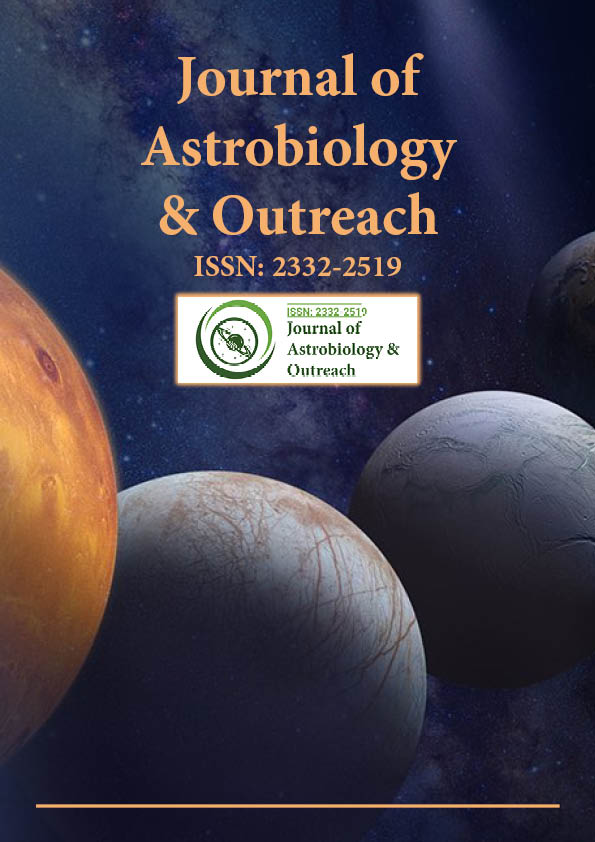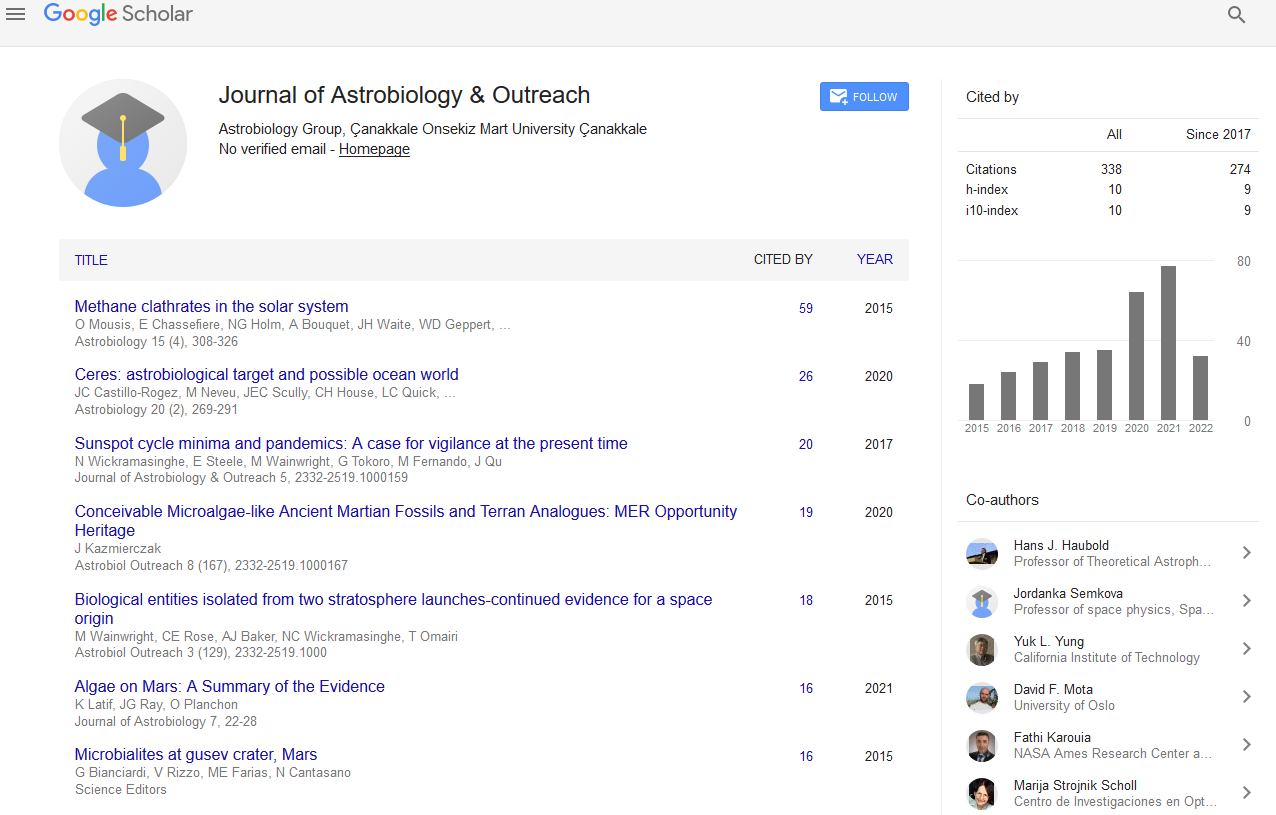Indexed In
- Open J Gate
- Academic Keys
- JournalTOCs
- RefSeek
- Hamdard University
- EBSCO A-Z
- OCLC- WorldCat
- Google Scholar
Useful Links
Share This Page
Journal Flyer

Open Access Journals
- Agri and Aquaculture
- Biochemistry
- Bioinformatics & Systems Biology
- Business & Management
- Chemistry
- Clinical Sciences
- Engineering
- Food & Nutrition
- General Science
- Genetics & Molecular Biology
- Immunology & Microbiology
- Medical Sciences
- Neuroscience & Psychology
- Nursing & Health Care
- Pharmaceutical Sciences
Short Communication - (2023) Volume 11, Issue 3
Unveiling Astrobiology's Influence: Space Science, Education, and Economic Implications
Nicole Joesch*Received: 01-May-2023, Manuscript No. JAO-23-21752; Editor assigned: 03-May-2023, Pre QC No. JAO-23-21752 (PQ); Reviewed: 17-May-2023, QC No. JAO-23-21752; Revised: 24-May-2023, Manuscript No. JAO-23-21752 (R); Published: 31-May-2023, DOI: 10.35248/2332-2519.23.11.293
Description
Astrobiology, the interdisciplinary study of life in the universe, has emerged as a field of immense importance in recent years. By exploring the origin, evolution, and potential existence of life beyond Earth, astrobiology not only expands our understanding of the cosmos but also holds promising implications for space science, education, and the economy. This commentary delves into the multifaceted ways in which astrobiology can impact these sectors, fostering scientific progress, driving educational advancement, and generating economic opportunities [1].
Space science advancements
Astrobiology plays a pivotal role in driving space science forward. By seeking evidence of extraterrestrial life, astrobiologists push the boundaries of exploration, fueling innovations in technology and instrumentation. The search for life beyond Earth leads to the development of cutting-edge tools and techniques, such as advanced remote sensing, spectroscopy, and robotics. These technological advancements, in turn, have far-reaching implications for space missions, enabling scientists to study celestial bodies with greater precision, unravel the mysteries of exoplanets, and analyze the habitability potential of other worlds [1-3].
Moreover, astrobiology serves as a unifying framework for collaboration among various scientific disciplines. It brings together researchers from fields such as astronomy, biology, chemistry, geology, physics fostering interdisciplinary cooperation exchange of knowledge. This interdisciplinary approach enriches space science by providing a comprehensive understanding of planetary processes, the formation of organic molecules, and the conditions required for life to emerge and thrive [3].
Educational opportunities
Astrobiology offers a wealth of educational opportunities at all levels, inspiring students and nurturing scientific curiosity. The quest to understand life's origins and its existence elsewhere in the universe captivates young minds, encouraging them to pursue STEM (Science, Technology, Engineering, and Mathematics) fields. Educational initiatives in astrobiology can engage students through interactive programs, citizen science projects, and hands-on experiments, fostering critical thinking, problem-solving skills, and a deeper appreciation for the natural world [4].
Furthermore, astrobiology's interdisciplinary nature provides a unique platform for integrating multiple subjects in the curriculum. By combining biology, chemistry, physics, and astronomy, educators can create dynamic learning experiences that transcend traditional boundaries and stimulate holistic thinking. Astrobiology's engaging and accessible nature also helps bridge the gap between scientific research and public understanding, promoting scientific literacy among the wider population [5-7].
Economic potential
Astrobiology's impact extends beyond scientific and educational domains, offering promising economic prospects. The exploration of space and the search for extraterrestrial life drives technological advancements, spurring innovation and creating new markets. The development of state-of-the-art instruments and spacecraft technologies fuels the growth of the aerospace industry, generating jobs and attracting investment. This leads to the emergence of high-tech startups, research collaborations, and partnerships between academia and industry, driving economic development and promoting knowledge-based economies [8].
Additionally, astrobiology missions and related projects serve as catalysts for international collaboration and diplomatic partnerships. Countries invest in space exploration, fostering scientific cooperation and promoting cultural exchange, thereby strengthening global ties. The scientific discoveries and technological advancements resulting from astrobiology research can also have practical applications on earth, such as in medicine, environmental monitoring, and sustainable technologies. These spin-off technologies not only benefit society but also contribute to economic growth and competitiveness [9-10].
Conclusion
Astrobiology's expanding horizon holds tremendous potential for space science, education, and the economy. Through pushing the frontiers of exploration, inspiring the next generation of scientists, and fostering innovation and economic growth, astrobiology serves as a catalyst for progress. It encourages collaboration, interdisciplinary research, and technological advancements, driving scientific understanding and technological breakthroughs.
References
- Kaltenegger L. How to characterize habitable worlds and signs of life. Annu Rev Astron. 2017;18(55):433-485.
- Chyba CF, Hand KP. Astrobiology: the study of the living universe. Annu Rev Astron. 2005;11(43):31-74.
- Fairen AG, Davila AF, Lim D, Bramall N, Bonaccorsi R, Zavaleta J, et al. Astrobiology through the ages of Mars: the study of terrestrial analogues to understand the habitability of Mars. Astrobiology. 2010;10(8):821-843.
[Cross Ref] [Google Scholar] [PubMed]
- Rampelotto PH. Resistance of microorganisms to extreme environmental conditions and its contribution to astrobiology. Sustainability. 2010;2(6):1602-1623.
- Bishop JL, Murad E, Lane MD, Mancinelli RL. Multiple techniques for mineral identification on Mars:A study of hydrothermal rocks as potential analogues for astrobiology sites on Mars. Icarus. 2004;169(2):311-323.
- Foing BH, Stoker C, Zavaleta J, Ehrenfreund P, Thiel C, Sarrazin P, et al. Field astrobiology research in Moon–Mars analogue environments: instruments and methods. Int J Astrobiology. 2011;10(3):141-160.
- Chatzitheodoridis E, Haigh S, Lyon I. A conspicuous clay ovoid in Nakhla: evidence for subsurface hydrothermal alteration on Mars with implications for astrobiology. Astrobiology. 2014;14(8):651-693.
[Cross Ref] [Google Scholar] [PubMed]
- Davila AF, Schulze-Makuch D. The last possible outposts for life on Mars. Astrobiology. 2016;16(2):159-168.
[Cross Ref] [Google Scholar] [PubMed]
- Foing BH, Stoker C, Ehrenfreund P. Astrobiology field research in Moon/Mars analogue environments. Int J Astrobiology. 2011;10(3):137-139.
- Stevens AH, Kobs Nawotniak SE, Garry WB, Payler SJ, Brady AL, Miller MJ, et al. Tactical scientific decision-making during crewed astrobiology Mars missions. Astrobiology. 2019;19(3):369-386.
[Cross Ref] [Google Scholar] [PubMed]
Citation: Joesch N (2023) Unveiling Astrobiology's Influence: Space Science, Education, and Economic Implications. J Astrobiol Outreach. 11:293.
Copyright: © 2023 Joesch N. This is an open-access article distributed under the terms of the Creative Commons Attribution License, which permits unrestricted use, distribution, and reproduction in any medium, provided the original author and source are credited

